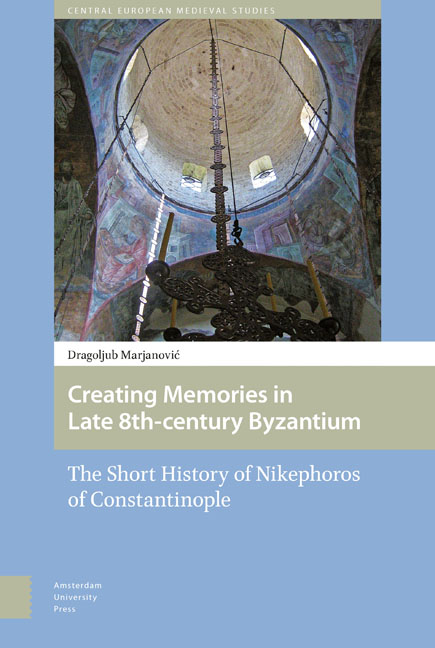Book contents
- Frontmatter
- Contents
- List of Tables
- Preface
- Introduction
- 1 Nikephoros the Layman
- 2 The Short History in the Byzantine Historiographical Tradition
- 3 Herakleios: Model of an Emperor
- 4 The Dark Century
- 5 Iconoclasts Restoring Order
- Conclusion: In Search of an Ideal Image of an Emperor
- Glossary
- Abbreviations
- Bibliography
- Index
3 - Herakleios: Model of an Emperor
Published online by Cambridge University Press: 11 December 2020
- Frontmatter
- Contents
- List of Tables
- Preface
- Introduction
- 1 Nikephoros the Layman
- 2 The Short History in the Byzantine Historiographical Tradition
- 3 Herakleios: Model of an Emperor
- 4 The Dark Century
- 5 Iconoclasts Restoring Order
- Conclusion: In Search of an Ideal Image of an Emperor
- Glossary
- Abbreviations
- Bibliography
- Index
Summary
Setting a Pattern
In the year 614, the Persian king Chosroes II sent an army against the Romans under the command of Shahin, who after capturing Jerusalem proceeded to raid imperial territories in Egypt and then returned closer to Constantinople, besieging Chalcedon in 615. Nikephoros illustrated in his Short History the total disorder which had settled in the Byzantine Empire as a result of the Persian raids. He then proceeds to narrate a meeting between Herakleios and the Persian general near Chalcedon, and it is in this scene that Shahin delivered a specific oration, emphasizing several crucial points which established a specific idea of peace that subtly dominated the entire narrative of the Short History. This oration brought to the forefront specific ideas. The Persian promoted ‘friendship and concord’ (φιƛία ϰαὶ σύμβασις) promoting these ideals in the presence of Herakleios, stressing that these virtues were opposed to ‘mutual hostility’ and ‘enmity’ (μήτϵ διίστασθαι ταῖς γνώμαις μηδ’ ὁπωστιοῦν ἀƛƛήƛοις ἀντιϰαθίστασθαι). Further, ‘good mutual relations and friendship’ (ϵὔνοια ϰαὶ φιƛία) were achieved by ‘wisdom and prudence’ (ἐπιφροσύνη ϰαὶ ϵὐβουƛία). As opposed to these virtues stood the distress and disorder in the states of the Romans and Persians, and detriment for all the subjects of both states (ϰαϰοῦν τὸ ὑπήϰοον), since Shahin also asserted that: ‘This concord should be as profound as our empires are great, for we know that no other state will ever appear to rival these our empires’. From ‘like-mindedness and peace’ (ϵἰ μὲν τὸ ὁμόγνωμον ϰαὶ ϵἰρηνιϰὸν θήσϵσθϵ) stems ‘happiness’ (ϵὐδαιμονία) and those who adhere to it become worthy of envy and admiration (ζηƛωτούς τϵ ϰαὶ ἀζιαγάστους ἐς τὸν ἅπαντα βίον δϵίϰνυσθαι). ‘Hardships’ (πόνοι) become ‘painless’ (ἄμοχθος), and ‘worries’ (φροντίς) yield to ‘joy’ (ϵὐθιμία). In contrast, hostility and hatred lead to many wars which are ‘unpleasant and hateful’ (δυσμένϵια ϰαὶ ἔχθος), and the consequences of war is great distress (μέγα ϰαϰοῦ τὸ τοῦ ποƛέμου ὑμῖν πέρας ἥζϵι), and the states fall into а ‘miserable and piteous’ (οἰϰτρότατος ϰαὶ ἀιθƛιώτατος) condition. The oration ended with the Persian promising that Chosroes II would establish a firm and long lasting peace with the Byzantines (τὴν ϵἰρήνην τὸ ƛοιπὸν ϵἰς τὸν ἅπαντα χρόνον βϵβαίαν τϵ ϰαὶ ἀϰραιφνῆ ϰαταστήσϵσθαι).
- Type
- Chapter
- Information
- Creating Memories in Late 8th-century ByzantiumThe Short History of Nikephoros of Constantinople, pp. 99 - 148Publisher: Amsterdam University PressPrint publication year: 2017



